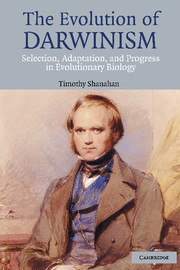4 - Darwin (and Others) on Biological Perfection
Published online by Cambridge University Press: 18 December 2009
Summary
Slow though the process of selection may be … I can see no limit to the amount of change, to the beauty and infinite complexity of the coadaptations between all organic beings, one with another and with their physical conditions of life, which may be effected in the long course of time by nature's power of selection.
(Darwin 1859, p. 109)Introduction
It would be difficult to find a more optimistic expression of the power of natural selection to shape living things to any imaginable degree of biological perfection. Such claims abound in Darwin's writings. Consider the famous closing words of the Origin:
It is interesting to contemplate an entangled bank, clothed with many plants of many kinds, with birds singing in the bushes, with various insects flitting about, and with worms crawling through the damp earth, and to reflect that these elaborately constructed forms, so different from each other, and dependent on each other in so complex a manner, have all been produced by laws acting around us. … There is grandeur in this view of life, with its several powers, having been originally breathed into a few forms or into one; and that, whilst this planet has gone cycling on according to the fixed law of gravity, from so simple a beginning endless forms most beautiful and most wonderful have been, and are being, evolved.
(Darwin 1859, pp. 489–90)- Type
- Chapter
- Information
- The Evolution of DarwinismSelection, Adaptation and Progress in Evolutionary Biology, pp. 93 - 114Publisher: Cambridge University PressPrint publication year: 2004



